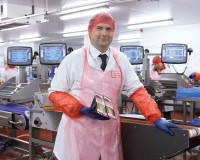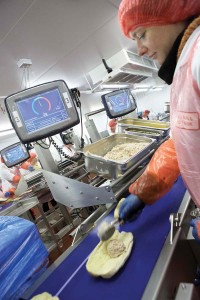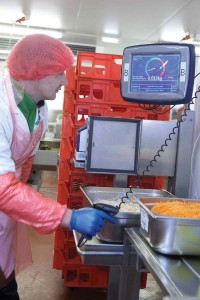 The STEVENS brand has long been synonymous with excellence in industrial weighing equipment, with a trading history going back over 160 years. Today the STEVENS Group specialises in IT-based weighing systems, providing recipe formulation, stock, portion control, checkweighing and traceability systems to over 1,000 blue chip companies across the UK, USA, Australasia and Europe to help ensure compliance with the BRC Storage & Distribution Standard and equivalent benchmarks.
The STEVENS brand has long been synonymous with excellence in industrial weighing equipment, with a trading history going back over 160 years. Today the STEVENS Group specialises in IT-based weighing systems, providing recipe formulation, stock, portion control, checkweighing and traceability systems to over 1,000 blue chip companies across the UK, USA, Australasia and Europe to help ensure compliance with the BRC Storage & Distribution Standard and equivalent benchmarks.
Part of Dataprocess Europe, the Italian-based retail IT specialists, since 1995, the STEVENS Group continues to innovate in 2011 as a leading provider of equipment, systems and service to the food, carrier and cash sectors, with clients returning again and again for creative, imaginative solutions to help solve their traceability problems. Toby Hawkins, Commercial Manager at STEVENS Group, spoke to The Grocery Trader.
The Grocery Trader – Toby, what does your role as Commercial Manager at STEVENS Group involve?
I find it very hard to define my role, as it is different almost every day. Ultimately my job is to drive the business forward through the fantastic team I have behind me. What I do on a daily basis depends on the needs that day but my overriding role is to provide the interface between customers and our development team, and act as a problem solver. Whatever process issues a customer has, it is my and my team’s job to use our knowledge and experience to come up with solutions that work in the real world. We could develop software that can do anything anyone could imagine, but if the operators on the shop floor can’t understand the interface it will not get used.
GT – Do you play a part in developing solutions for individual clients?
Yes, I do. Our standard solutions go through the guys on the road, but I become involved with larger projects. Sometimes it is necessary to directly involve the developers with the customers, but most of the time, it goes through myself and my team.
GT – Where do your systems fit into the chain between the factory floor and the company’s information systems?
Our systems fill the black hole between companies’ Enterprise Resource Planning applications and the minute-by-minute reality of the production process. They tell the manufacturer exactly how much material they are using objectively, in real time, and make it relatively easy to achieve compliance with the BRC Standard and the retailers’ requirements and produce objective historical data if needed.
GT – What specific statutory information do your systems collect?
 We help our clients become compliance with ingredient declaration legislation, principally the Food Labelling Regulations, Average Weight Legislation and The European Traceability Legislation (178/2002). Our technology takes out all the paperwork involved in this record keeping and networks the output to whoever needs to see it.
We help our clients become compliance with ingredient declaration legislation, principally the Food Labelling Regulations, Average Weight Legislation and The European Traceability Legislation (178/2002). Our technology takes out all the paperwork involved in this record keeping and networks the output to whoever needs to see it.
Effectively, by controlling the system, the ingredient quantities and their source will always be true to the label. The responsibility is taken away from the operator. The bottom line from the retailer’s point of view is, if the suppliers are using our technology the retailer can be sure their systems will be fully compliant with the retailer’s supply chain standards. It’s that simple. In a recall, the facts about that batch are there in an indisputable, indestructible form.
GT – What proportion of manufacturers still do their ingredient declarations and other production record keeping on paper? Is there any deadline for these records to go digital?
It is very difficult to quantify the exact numbers. Outside the UK and a few other European countries, I would say the majority. When a company starts up, it will always rely on paper but as it grows and broaden its customer base, that process becomes more and more arduous and difficult, or expensive, to police. There is no deadline to going digital in the UK or any other country that I am aware of, outside the USA, where legislation has recently been passed making digital traceability records mandatory, although the deadline is still under debate and being lobbied about.
GT – What are you doing to win over the paper-based manufacturers to the digital way of doing things?
In all honesty, most of our clients and potential clients want to go to a paperless system. It is the Holy Grail for almost all departments, particular the quality and technical side. The big advantage with the majority of our systems is that the ROI is achieved within 12 months. Along with the benefits of paperless information comes a whole raft of ingredient and time saving, which can be realistically quantified and used as a justification for implementing a system.
GT – How do you get to an ROI within 12 months?
Typically, using our kit to weigh products filled by hand gives savings of two to five percent: so if you’re spending £1million a year on raw materials, you save a minimum £20,000, which roughly equates to the cost of a small to medium size system. You will get the same annual materials savings from then on, so after that it’s a regular dividend.
GT – You are about to relaunch your web site, www.stevensgroupltd.com. What information will be on it? Can you provide quotes online?
There is still a bit of work to do on the site but it will effectively contain overviews of our company, our key people, our products and, as you would expect, customer testimonials. The main focus has been to make it very user friendly and interactive. Unfortunately, due to the nature of our products, it is not possible for us to quote “blind” as it were but you can request a call back and with the team of people we have on the ground, you can have an experienced product specialist on site inside 24 hours.
GT – Where is the STEVENS Group’s UK base? How many people do you employ here?
We are based in Blackburn, with strategically located depots around the country. We employ approximately 60 people in the UK, about half HQ based.
GT – Where do you develop your technologies and manufacture the equipment you supply to UK customers?
 All our R & D and development is done in Blackburn. We also have a manufacturing and assembly facility here, which produces all the hardware that goes to our customers worldwide. The Vantage terminals are developed here but manufactured at our parent company’s facility in Milan.
All our R & D and development is done in Blackburn. We also have a manufacturing and assembly facility here, which produces all the hardware that goes to our customers worldwide. The Vantage terminals are developed here but manufactured at our parent company’s facility in Milan.
GT – What proportion of Dataprocess’ turnover does the STEVENS group contribute worldwide? Which other countries are STEVENS’ solutions sold in?
Stevens accounts for approximately 50% of Dataprocess turnover worldwide. Our solutions can be sold anywhere in reality, but we have active businesses or partners in Australia, New Zealand, USA, Canada, Spain, France, Italy, Republic of Ireland, Poland and Greece. We are actively investigating several other markets as we speak, with plans to launch into two or three more countries directly and two or three others through distributors in 2011.
GT – You’re part of Dataprocess Europe, yet you’ve retained the STEVENS identity over the years. The STEVENS brand is clearly very important to your customers. What does the STEVENS brand stand for?
STEVENS stands for quality of service from start to finish. We work with our customers; we don’t just sell them a box. We supply total quality and offer full back up. We make sure the customer gets the right solution, every time. We offer dedication, focus and honesty – we don’t claim we can achieve anything we can’t.
GT – How does the relationship work with Dataprocess?
They’re very supportive and take an active interest, while allowing us to operate autonomously day to day. Being part of a larger group means we have access for funds and resources for investment. Their approach is very hands off, as long as we deliver on the budgets I put forward… and we always deliver!
GT – Do you cross-sell your different solutions with Dataprocess at all?
The solutions Dataprocess offer in the retail industry don’t really translate into the UK market very well, but if an opportunity comes up, we have the expertise to follow it through and provide a solution. In the UK it’s not economically feasible to offer weighers and labellers of Dataprocess’s sophistication to the major retailers. At the same time, independent UK retailers in general don’t want this level of sophistication, unlike their Italian and other European counterparts.
GT – Can you talk us through the different weighing, portion control and traceability products and systems in your portfolio?
All our systems are based upon our in-house developed software and the shop floor interface is managed through our Vantage terminal, an IP66 touch screen PC with built in weighing capability. With this base we can add on any and all accessories such as weigh scales, label printers, barcode or RF ID scanners, temperature probes, conveyoring, rejection and alarm systems. The list is truly endless!
Our modules can control everything from goods in to despatch, giving full factory floor traceability and weight control. The goods in system will receive the raw materials as they arrive at the factory capturing all relevant QA and HACCP information for future analysis if necessary. Ingredient stock levels are then monitored and their location reported upon, including any quarantined ingredients. Until the ingredients are released through a Critical control point, they cannot be used in the production area thereby ensuring due diligence in sieving, de-boxing or washing areas. Once released through a CCP, the ingredients can be weighed up over a recipe formulation terminal with the tolerances on each ingredient with a recipe being enforced to ensure product consistency whilst capturing the onward traceability. Further control and due diligence can then be captured at the mixing areas by using the collation modules, which will ensure that the right premixes are brought together and making sure that any other bulk or non-weighed up materials are also capture and not missed out. Moving into the more high risk areas, the various components of the final product can be controlled and portioned as they go down the line, making sure the right quantity of each one is contained in the final product. As a final stage of the compliance loop, both off-line sampling, in-line checkweighers and combination systems are available to provide average weight records for due diligence. As the products are sampled, dynamically or otherwise, they can be put into final product inventory automatically, ready for dispatching to the end users, if necessary, with the appropriate labelling applied to them.
In summary, if there is a process that needs monitoring or controlling, we can do it. We even have a few discreet systems in place, such as waste management to capture the traceability and quantity of scrap coming from discreet locations and bowl washing cycle monitoring systems.
GT – How might these fit together in a typical solution for a food or drink manufacturer?
We would supply the hardware, software and accessories to fit the individual process flow. The system is completely modular so you can start with a small investment at any point, and add different sections and software later.
GT – Can you name any of your customers and talk about what you do for them?
We work with all shapes and sizes of food manufacturers in the UK, from On A Roll sandwiches, through medium sized ones like Higgidy Pies to Bakkavor, Hovis, Kingsmill and ABF, and have done so for 30-40 years in some cases.
GT – What non-food products can your dynamic checkweighers be used to measure?
Pretty much anything can be weighed on our systems: the key is the degree of accuracy required. We can weigh anything within known limitations.
GT – Can you use them to count money?
 You can use our systems to count money, and we do a lot of this work in the cash handling sector, developing specialist solutions for the big cash handling companies. These work on the same principle as in food manufacturing, based on known weights of material and providing verifiable traceability and efficiency information.
You can use our systems to count money, and we do a lot of this work in the cash handling sector, developing specialist solutions for the big cash handling companies. These work on the same principle as in food manufacturing, based on known weights of material and providing verifiable traceability and efficiency information.
GT – How easy are your systems to use?
Using them is extremely easy. With a few clicks of a button, everyone in the business and their trading partners who is authorised to see it can have all the data they need. The key is to make sure people on the shop floor find it easy to use, and that’s what we focus on. The programmes must be intuitive and accessible for all levels of staff.
GT – What different functions in the business would need to access this information?
It’s relevant to everyone – finance, technical, quality, manufacturing, production and operations. It depends on what you use the system for: usually the technical manager would take overall responsibility, and the others would share the data.
GT – How long are production records stored for on the system?
They can be stored there indefinitely. The data has a very low footprint and is usually stored on a server.
GT – What production volumes does a supplier need to operate at to make it worth investing in your systems?
Typically people should start looking at our type of controls when turnover reaches £2m, but if customers demand it our entry system RFS Lite offers a scaled down solution for smaller companies who want a similar degree of control. These are based on the same Vantage terminals as our larger solutions, and can be expanded and networked as businesses grow.
GT – Who needs to be involved in the decision to buy the system?
You need buy in from various people. Often the lead comes from the technical team or quality control, or production. The whole management team needs to be involved, especially IT in the case of a networked system.
GT – Can you tailor your equipment to the specifications of individual customers?
Absolutely. Our solutions are completely configurable, with many thousands of options already built in, but we have a whole team of software engineers just waiting for a challenge.
GT – How long do your solutions take to generate a return on investment for the customer?
It is very rarely more than 12 months.
GT – It’s been a pretty tough last two years for business generally. How has the STEVENS Group been doing during this time?
 We were enjoying double-digit growth before the recession, but recently it’s been single-digit. Our customers in the carrier business cut their spending but the food and cash handling sectors continued growing, so we still grew overall, but more slowly. In 2011 we forecast a 25% increase in sales.
We were enjoying double-digit growth before the recession, but recently it’s been single-digit. Our customers in the carrier business cut their spending but the food and cash handling sectors continued growing, so we still grew overall, but more slowly. In 2011 we forecast a 25% increase in sales.
The continued growth is driven by manufacturers looking for solutions to save money in the present climate, and our growth in exports. Some 80% of Stevens Group sales are in the UK, the balance being exports, but the UK figure includes a very substantial service business. More importantly, we have enjoyed over 300% growth per annum in our exports over the last three years.
GT – Do you also supply your equipment to distributors and integrators of food manufacturing equipment?
Most of our sales are direct, but we can supply to integrators as required.
GT – What are the steps in developing and then implementing a solution?
We usually act response to a customer problem – we develop the solution and implement it. Generally the system we put in works well, then later we come back and expand it.
GT – If people already have some form of production management technology but are thinking of reviewing it in line with their changing needs, do you offer audits?
I’ve never sold a new system without going on a production floor and checking the situation there. We will occasionally carry out feasibility studies and then charge for them, but generally consultations are free.
GT – What is the current traceability and other legislation you work to?
We work to the European, BRC and EFSIS standards and the supermarkets’ own criteria. Generally these are in line with each other regarding track and trace, weight and compliance with weight and labelling.
GT – Are you involved in developing food processing and traceability standards?
 As a company we don’t get involved with developing standards, but I do get personally involved with developing internal standards for customers and working on procedures with their technical teams. I also work as an unpaid advisor to our customers on a senior level, which I enjoy doing.
As a company we don’t get involved with developing standards, but I do get personally involved with developing internal standards for customers and working on procedures with their technical teams. I also work as an unpaid advisor to our customers on a senior level, which I enjoy doing.
GT – Have you won any awards for innovation or for exports?
We don’t really tend to go in for awards but are looking at a number of export related ones for 2011, as we have increased our export levels by over 300% per annum for each of the last three years. There must be an award in there somewhere!
GT – What are the major external factors affecting demand for your systems?
Legislation changes tend to be few and far between. The main driver is clients’ customers’ demands – the major retailers saying do this or be fined. Also there’s the general money factor – because we can deliver a cost saving, there’s a continued demand for systems to enable them.
GT – In these troubled times is there any Government support for UK companies who invest in your technology?
Before the recent budget cuts there were various regional grants available from regional development agencies and food development bodies, but unfortunately there are fewer of those now.
GT – Finally, where do you see STEVENS Group going from here?
We have solutions that everyone has a need for. The boundaries that previously stopped us doing business outside the UK are no longer there, and we have no fear of going into new markets. We plan to expand our horizons further and keep growing into more countries, while here in the UK we will continue to service our customers to the high standards that they have come to expect and deserve from us. Of course we will also keep improving and innovating, in the fashion that makes us unique in the industry.
The STEVENS Group
Tel: 01254 685200




Comments are closed.